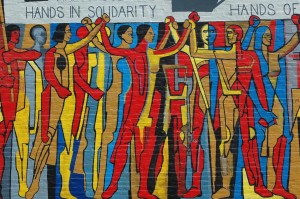Thoughts on Solidarity at the TRC
By Elizabeth Kessler
 I’ve been thinking about solidarity a lot lately. What is solidarity? What does it look like?
I’ve been thinking about solidarity a lot lately. What is solidarity? What does it look like?
Solidarity is work that is done side by side with the oppressed, working against oppression. It is different than “help”. “Helping” is sometimes patronizing and reinforces hierarchies, even unintentionally. Solidarity is about giving agency to the oppressed to decide how to work against their oppression, while the rest of us follow their lead.
What do acts of solidarity look like? Often we think of solidarity work as obvious political action, like when settlers show up at an Idle No More event to show support, or when we organize an action to show solidarity with people fighting for justice in a far away place.
This week I have been reminded of a different form of solidarity. I have been volunteering at the Truth and Reconciliation Commission (TRC) National Event in Edmonton, registering residential school survivors as they arrive. The purpose of the TRC is to give survivors a chance to share their stories with others, whether in public or in private. Hundreds of people are here to share their stories, and hundreds of others are here just to listen – there are overwhelming crowds. At the volunteer training, after we were briefed about the history and purpose of the TRC, we were reminded that it is not our job as volunteers to take on the grief and the job of listening. While this is the purpose of the event and it is okay to participate in it, the volunteers are primarily here to make things happen, to make things flow.
We are doing the grunt work in the background that, while not particularly exciting or seemingly interesting, is absolutely crucial to making the event happen. Doing this work, repetitive and perhaps boring, allows everyone else to focus on what is meant to happen here: truth telling.
This isn’t easy. I have qualms about the TRC – concerns about its structure, sources of funding, and how it will be represented in history. But it is obvious from being here that the event itself is what many Indigenous people want and need. These survivors of horrific racism are getting a chance to tell their stories in public, with enormous dignity.
I know that doing the background work allows these stories to be heard. To be in solidarity, we need to be ready to accept the menial work and things that might seem unimportant, and just get them done. We need to be ready to do what is asked of us.
If the work that is asked of us seems unimportant, that’s okay: it is important and it allows people who have been marginalized to step into leadership roles while we take on the background work. The next time you want to work “in solidarity”, think about logistics, think about child care, think about helping someone in a wheelchair, or about making meals. Let us ask, what else needs to be done?
Sometimes, I think that solidarity becomes a buzz word – a word that we simply say to people when we feel empathy for what they are fighting for. Solidarity doesn’t mean anything if we don’t take action, but action doesn’t have to be big, obvious, or public. It simply means doing what is needed, and what we are asked to do.



